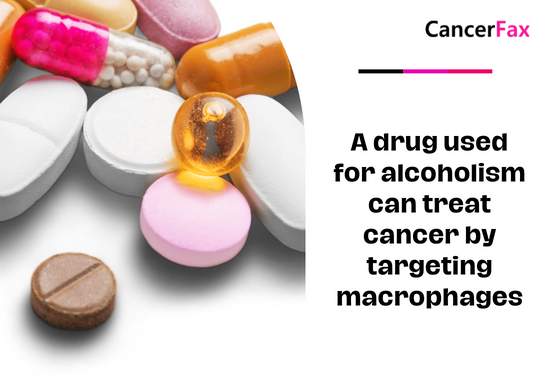A drug used for alcoholism can treat cancer by targeting macrophages
A research group led by Yuya Terashima from Tokyo University found that a drug used for alcoholism can treat cancer by targeting macrophages.
As per WHO and International Agency for Research on Cancer (IARC) data, there were 18.1 million new cases and 9.6 million deaths in 2018. One in 5 men and one in 6 women worldwide develop cancer during their lifetime, and one in 8 men and one in 11 women die from the disease. Worldwide, the total number of people who are alive within 5 years of a cancer diagnosis, called the 5-year prevalence, is estimated to be 43.8 million.
Lung cancer is the most common type of cancer in men (14.5%) and the leading cause of death in men (22%). This is followed by prostate cancer (13.5%) , colorectal cancer (10.9%), & liver cancer (9.5%). Among women, breast cancer is approximately 25%, followed by lung cancer (13.8%), colorectal cancer (9.5%), & cervical cancer (6.6%).
Building up a treatment to battle malignant growth remains one of the most troublesome difficulties in medicinal research. Malignant growth owes its infamous personality to the way that the disease cells utilize the host’s own resistant framework to develop and spread, finally getting savage. Invulnerable cells like macrophages, which usually battle to ensure ordinary cells, are commandeered by dangerous disease cells, and populate the earth around the tumors, turning out to be tumor-related macrophages (TAMs).
Actually, it was discovered that the malignant tissue of patients for whom immunotherapy was not fruitful was in fact rich in macrophages, affirming the connection between the disease and the TAMs. It is these TAMs that produce flagging proteins like chemokines and trigger the inhibitory resistant checkpoint discharges that make an immunosuppressive tumor condition, which ensures the malignant growth cells and permits their quickened development. Since the TAMs encourage the spreading of malignant growth cells, managing them as a remedial methodology for battling disease has picked up consideration as of late.
A research team from the Tokyo University of Science, under the direction of Yuya Terashima saw this as an opportunity to look into the field of developing new anti-malignant growth drugs. Their original work in Nature Immunology 2005 revealed the disclosure of another objective protein called FROUNT, which is connected to the guidelines and development of the TAMs. In this way, FROUNT was directly linked to TAM rules because it increased “chemokine signaling,” a type of cell communication that is necessary for TAM gathering and movement.
At that point, so as to diminish any symptoms, the group additionally built up an autonomous technique for restricting the impact of FROUNT on chemokine motion by repressing the connection between the two. The group screened 131,200 mixes and focused on disulfiram, a medication used to treat liquor abuse, and referred to for its potential as an enemy of malignant growth tranquilizer. This medication was found to legitimately tie to the FROUNT site, making FROUNT inaccessible for collaboration with the parts of chemokine flagging.
Considering the outcomes, Terashima clarifies, “When tried on mice, disulfiram repressed the development of macrophages and stifled the development of malignant growth cells. Thus, our findings reveal a new way to treat cancer that can stop the growth of cancer cells that are hard for immune systems to detect when used together with disulfiram.
Hopefully, we will get to see new therapies in the treatment of cancer.


